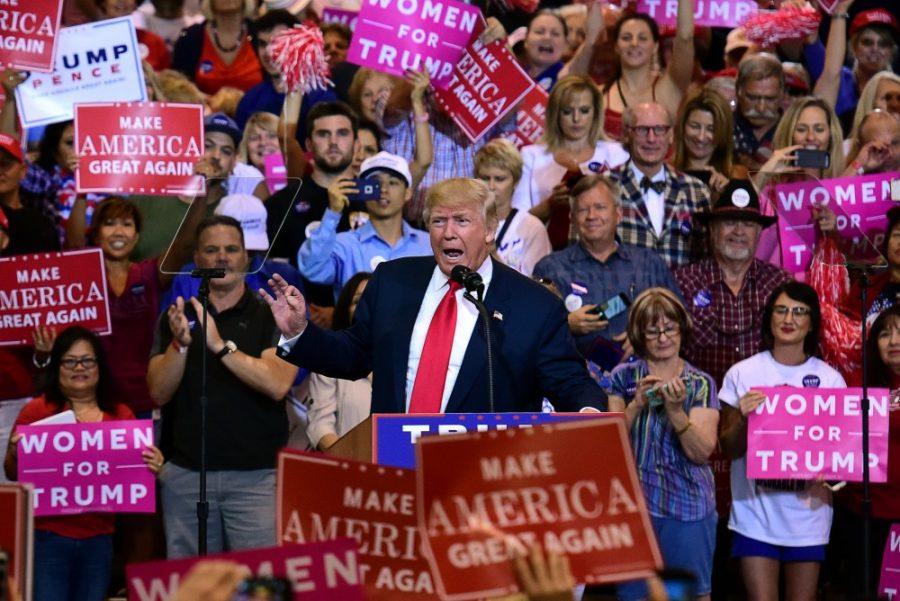
President Donald Trump has been acting like an authoritarian since the moment he rode down an escalator in 2015 to announce his campaign for president and began one of the most erratic and constant exercises in “othering” the world has ever seen. Othering is the practice of defining a group of people as different — in other words (pun intended), “us vs. them,” when “them” is any group that disagrees with or is different than “us.” It has existed for as long as complex societies have, but it has come to a head in the past half-millennia as authoritarians have used it to make certain people out to be threats. Prominent examples include the enslavement of African people, the Holocaust, Mao’s cultural revolution and segregation in the United States. In an article from the journal “Othering and Belonging” out of the University of California, Berkeley, John A. Powell and Stephen Menendian described othering as the defining problem of the 21st century.
Trump’s othering has extended to immigrants, Muslims, the media, fellow Republicans, Democrats, poor people, rich people, allied nations, the UN, the EU, NATO, China, Black people, the public, protestors, scientists, public health systems — but, crucially, not the COVID-19 pandemic.
When Trump riles up a crowd at a rally with claims that any one of the groups listed above are out to get them, he is uniting them behind him as the solution to the problem. It’s how he ensures their support. COVID-19 is the ultimate outgroup. It is a legitimate threat to everyone, so there is no need to fear monger. A president can directly lead a response that has a massive impact on the outcome of the pandemic. And finally, unlike racist or xenophobic othering, othering a pandemic doesn’t draw criticism from anyone.
RELATED: President Trump’s COVID-19 treatment plan: What was it exactly?
Trump could have painted COVID-19 as the greatest threat the U.S. has faced in a century or more — an invisible enemy that infects and kills more indiscriminately than even the vilest dictator. He could have embraced the science and engaged in a massive national mobilization — certainly as big as, if not bigger, than that of World War II — to combat the pandemic. He could have worn a star-spangled mask and touted the jobs he saved with a hasty response, and the new ones he created in manufacturing protective equipment. That all may sound like a stretch given the president’s limited capacity for effective governance, but it wouldn’t have been that hard. And rest assured that had he taken this line, all of the Republicans currently protesting masks and holding White House gatherings that end up as “super spreader events” would be standing six feet apart with covered faces at an event to commemorate the signing of another aid bill.
The pandemic would finally have given Trump the enemy he has been desperate to manufacture since he started his bid for office. He would be a hero, a savior and he might even be headed for reelection in spite of all of the horrible things he has done.
Wait.
Allow me to correct myself. I should say “a president could” because Trump cannot. Trump, like many authoritarians, isn’t driven by reason or logic. This isn’t a new observation, but it has never been clearer than it is amidst COVID-19. To Trump, admitting the coronavirus poses a threat means admitting a compromise in the obsessively cultivated façade of strength he has built. It would require listening to others who know more than he does about how to fight the pandemic. It would mean canceling the campaign-style rallies he has held consistently throughout his presidency (even when not remotely close to an election) and going without the sustained applause he so desperately needs to nurture his fragile ego.
RELATED: From visas to voting, international students express their thoughts on the upcoming election
It isn’t that Trump won’t take the pandemic seriously, it’s that he can’t. Doing so would require him to overcome the massive insecurity he feels in the face of those more intelligent than he is, not to mention working with the media that has committed the unforgivable sin of not covering him with constant adoration. He would have to accept science and respect scientists. He would have to work with state leadership that hasn’t always been agreeable to his administration’s agenda. All of these things conflict with who Donald Trump is at his core.
Overcoming internal dissonance on the level Trump faces when trying to govern effectively during a pandemic requires strength and courage, and he has not an ounce of either. We can all be horrified and saddened at the more than 200,000 dead Americans or the hit our reputation has taken internationally, but we certainly shouldn’t be surprised.
Aidan Rhodes is a journalism major from Flagstaff, Arizona. He is a passionate chef, athlete and writer. Follow Aidan Rhodes on Twitter









